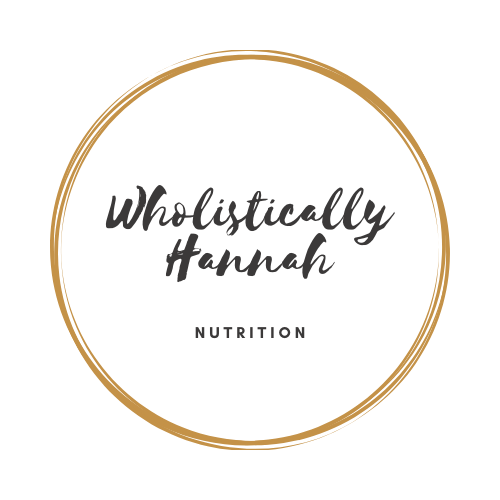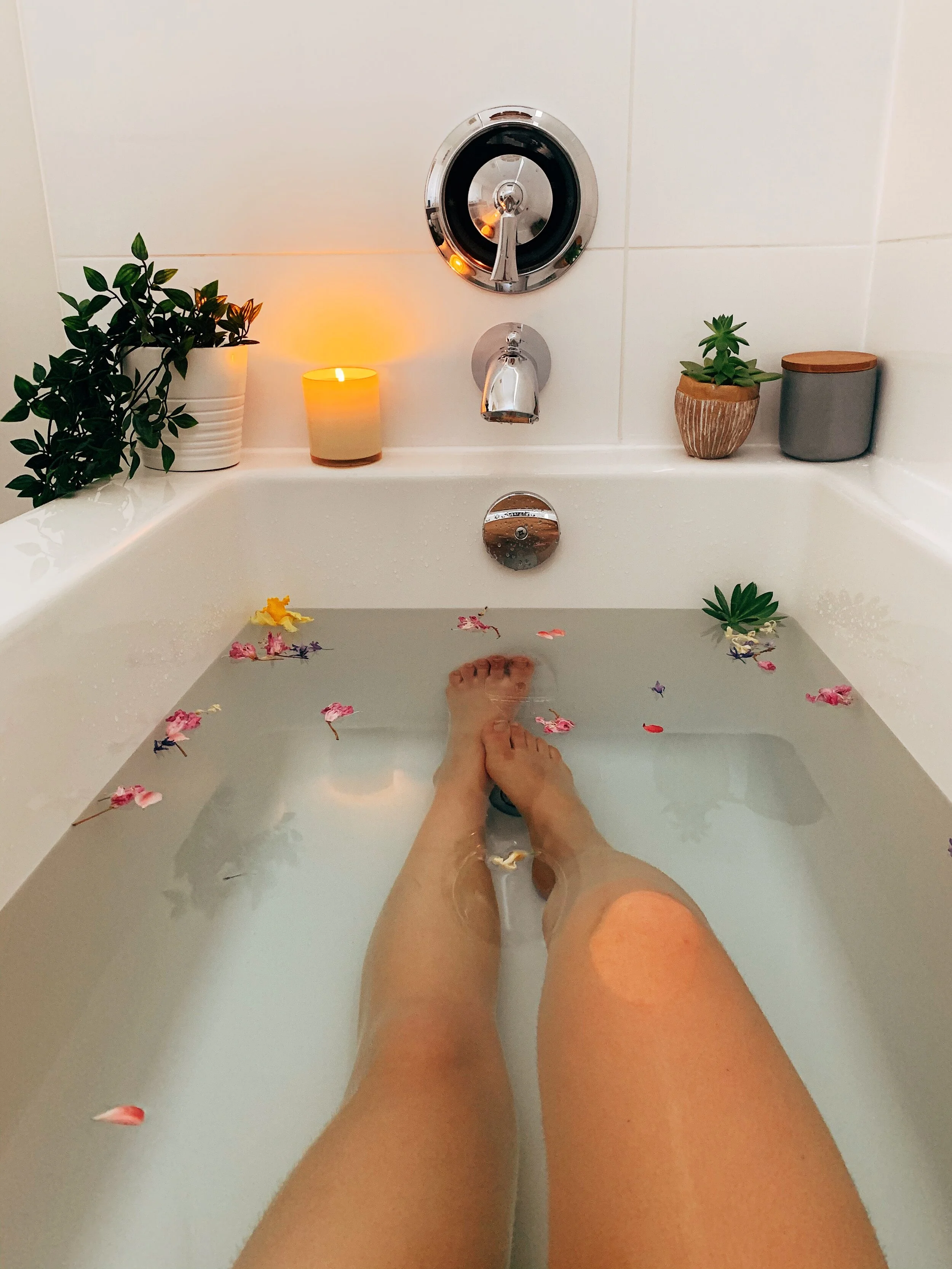My Amenorrhea Journey
/What is Amenorrhea?
Amenorrhea: is classified as not having your menstrual cycle for more than 3 months at a time.
It all started back in high school. I was a young girl, struggling with bad body image, her relationship to food, and to herself. And that's when the food restriction and exercise obsession began. It was an obsession to change her body any way she could. A belief that the smaller she made herself, the more she would be loved.
By the world, by others, and most importantly - by herself.
Fast forward to a year after graduation. I was still exercising vigorously, but my relationship with food had improved. Around this time, I started learning about the negative affects of hormonal birth control pills, which I had been taking religiously over the last three years. At the time, I was bleeding regularly. I decided to stop the pill, assuming my period would continue on as normal.
But the following month, it never came.
My period was gone. And this was the beginning of my journey of hormonal imbalances, irregular cycles, and periods of amenorrhea. Little did I know, I'd still be on this journey three years later.
The down-low on hormones.
Our hormones are produced by a number of glands located all throughout the body. This network of glands is called our Endocrine System. Not only do these glands secrete hormones; but they also control almost every function that takes place within the body. From our sleep cycles and appetite, metabolism and digestion, to balancing blood sugar levels and our natural response to stress.
The Hypothalamus is a small, almond-sized gland located at the top of our brain who plays a very important role: he is the overseer of the entire Endocrine system. Essentially, the Hypothalamus controls all the other hormonal glands by ordering them to either start or stop the production of various hormones. By doing so, the Hypothalamus helps maintain balance within the body and reproductive organs. The health of our reproductive system depends largely on the Hypothalamus, and his ability to release or inhibit specific sex hormones at just the right times throughout the month.
Amenorrhea occurs when there is a miscommunication between the Hypothalamus and our Ovaries. For some reason, the Hypothalamus stops telling the ovaries to release the necessary hormones needed to complete our cycle and induce a bleed. The result? No ovulation, and no period.
According to the ‘FLO website’, almost 50% of females who exercise regularly experience some form of menstrual irregularity/ dysfunction, such as irregular or missing periods. And 30% of these females struggle with amenorrhea.
What causes Amenorrhea in the first place?
After years of nutrient depletion (from both food restriction and the pill), combined with the physical stressors of intense workouts and low body fat, it was no wonderful I didn't get a period. My hormones were completely out of balance!
Birth Control Pills
Birth control pills can cause SO MANY issues, especially if you've been on the pill for quite some time. Basically, "the pill" supplies our body with a dose of synthetic hormones, and induces a "fake" bleed. So, when we're on hormonal birth control, we're not actually getting a real period. This constant supply of synthetic hormones tells our Endocrine System it no longer needs to make sex hormones. And when we go off the pill, our body often forgets how to produce these hormones on it's own. On top of this, the pill depletes our body of nutrients necessary for a healthy cycle. Post-pill induced amenorrhea is one of the most common causes of losing our periods.
Low Body Weight
This typically happens one of two ways, or a combination of both:
1.) Over Exercising
We always hear about the benefits of exercise, but no one ever talks about the danger of taking it too far. Society tells us we need to constantly push our bodies in the gym to be "fit" and "healthy". But in reality, too much exercise can wreak havoc on our hormones and reproductive system. Long, intense workouts and heavy energy expenditure raises cortisol levels (our stress hormone) and puts additional stress on our bodies. You don't have to be exercising at extreme levels to loose your period. Every body is different, and a workout schedule that might seem "normal" for one women, can be hormonally damaging to the next. It's important to let go of comparison and really tune into your own body. Do what feels supportive to you.
2.) Under Eating
This means not eating enough food, calories, or nutrients (like carbohydrates or healthy fats) to encourage and support a menstrual cycle. It can be especially hard when society tells us to look and eat a certain way. Not to mention the huge emphasis on clean eating and certain trendy (yet restrictive) diets like keto, sugar-free, raw vegan, etc.
Chronic Stress
Constantly elevated levels or cortisol and adrenaline (our stress hormones) can contribute to a variety of hormonal imbalances. Stress causes a reduction in the production of hormones that are necessary for ovulation to occur. And when our body is under high levels of stress, it doesn't feel safe. The last thing it wants to do is grow another human being inside! So to save energy, our body shuts down it's reproductive system as a form of protection.
Undernourishment
This could be caused by poor eating habits or nutrient malabsorption due to gut disorders and digestive imbalances.
Bringing back my period.
My plan: Focus on good, wholesome nutrition and make sure I'm eating enough to support my cycle. Supplement with products that boost hormones naturally, and ensure I don't have major nutritional deficiencies. Exercise LESS, and give my body permission to rest whenever it needs. And last of all, continue learning to manage stress and take care of my emotional well-being.
DIET
Food is medicine, and supporting our bodies with nutrition might be one of the best ways to bring back our period. Aside from eating enough calories in general (this was big for me), it's also important to eat a balance of all 3 macronutrients: Wholesome carbohydrates, protein, and healthy fat. Foods to focus on:
Complex carbohydrates: Whole grains like quinoa, buckwheat, amaranth, and brown or wild rice, starchy root vegetables and tubers like squashes, potato and sweet potatoes, carrots, turnips, and beets.
Organic protein: Animal protein like poultry, free-range eggs, wild-caught fish, grass-fed beef, bone broth, and vegetarian protein sources like beans and legumes (soaked to improve digestibility), spirulina, fermented tempeh, and nutritional yeast.
Healthy fats: Omega 3's like wild-caught sockeye salmon, flax, chia, and walnuts, coconut and coconut oil, avocados, and hemp seeds.
SUPPLEMENTS
Chastebarry: Also known as Vitex, it's an herb used to naturally balance estrogen and progesterone levels. Studies show that the plant dramatically increases our sex hormones when taken regularly over a period of time. I started taking Chastebarry 3 weeks ago, and plan to continue until my period returns.
Vitamin B Complex: B-vitamins are needed to maintain healthy menstrual function, but are often severely depleted from chronic stress or birth control pills. I take a multi b-complex everyday, and have noticed a huge difference in my stress levels.
Zinc: Women who don't have a period are often zinc deficient. Especially if you've been on birth control pills for a number of years! I personally feel zinc supplementation is so important for me after having a Copper IUD for over 2 years. This is because excess copper levels in our body can cause a major zinc deficiency. If you've ever had a Copper IUD, I highly recommend researching this topic on your own - and consider getting your zinc levels tested!
Maca: Maca root is said to help increase fertility and libido in both men and women. I recently started taking it again, and already feel like the powder is helping restore hormonal balance. I like to mix together 1 tsp Organic Traditions maca powder, 1 tbsp of cacao powder, and some full-fat coconut milk to make a delicious, chocolate-ey drink.
LIFESTYLE
Exercise appropriately
Support your body and hormonal system by exercising appropriately.
For many of us, this might mean reducing the intensity AND amount of exercise we do on a weekly basis.
Exercise is actually a huge stressor on our bodies. Sometimes that stress is good, and sometimes it's not. It really comes down to the person, your body, and what's going on in your life at that time. Certain workouts like HITT (high intensity interval training) or lengthy cardio sessions raise cortisol levels and and intern affect all other hormones. Focus on shorter workouts and slower, more calming movements like walking, yoga, pilates, or gentle resistance training instead. And when your body's asking for it, give yourself permission to rest.
Balance blood sugar
Balancing our blood sugar levels results in more balanced hormones. This means having breakfast within 1 hour of waking, and eating every 2.5-3.5 hours throughout the day. Snacks are your best friend! And if you get to the point of "hanger", you've waited to long. I also try to include a protein and fat source with my carbohydrates so I don't spike my glucose too much.
Create stress management techniques
A mindfulness practice like meditation or deep breathing - this has been HUGE for reducing my stress
Social media detoxes regularly
Creating time for yourself (I like morning and evening routines)
Declutter your space
Setting boundaries and learning to say no
Make time for fun, creativity, and play





